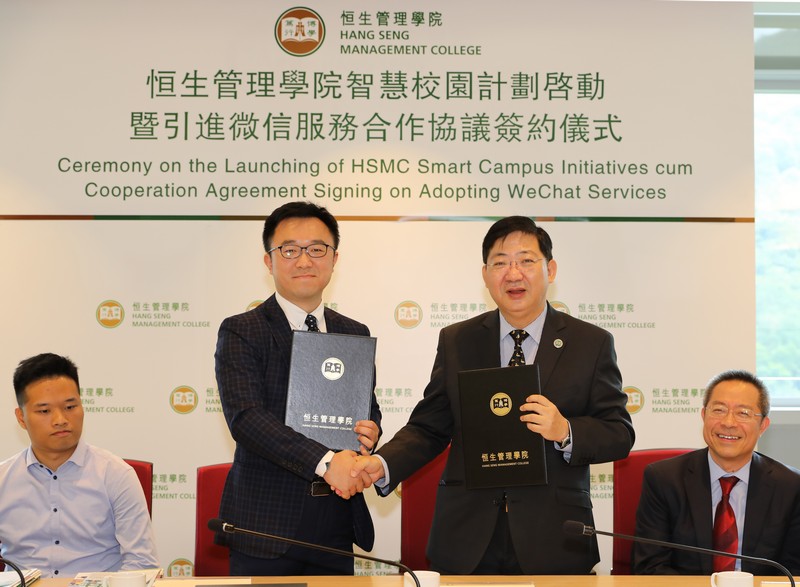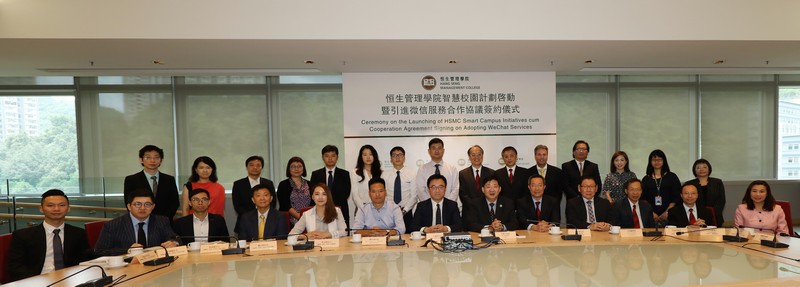26 July 2018
HSMC and Universal Pocket (HK) Co Limited (Universal Pocket), a local innovation and technology enterprise, signed an agreement to launch a smart campus scheme by introducing smart technology of WeChat in the campus, with an aim to strengthen industry-university co-operation, and to transform HSMC into a campus with smart learning, management and interaction.
Speaking at the agreement signing ceremony, Professor Simon Ho, President of HSMC said, “HSMC is looking forward to the implementation of smart campus scheme, to integrate technology and liberal education in the provision of all-round development to students.”
Mr K K Wong, Director of Universal Pocket, said, “We believe the combination of mainland’s internet technologies and the advantages of local higher education sector, can bring greater convenience to both students and the management, in addition to encourage cultural exchanges between mainland and Hong Kong.” Universal Pocket is a working partner of Tencent’s WeChat Pay.
Furthermore, a HSMC delegation, with more than 20 senior management team members and academic staff, together with Mr K K Wong and Ms Maggie Li, General Manager of Universal Pocket, also visited the Tencent’s headquarters at Shenzhen High-tech Industrial Park, and met with Ms Mia Ma and Mr Frank Geng, Directors of International Business Development of WeChat Pay. The delegation was impressed by the intellectualised and humanised management of Tencent, and reaffirmed the intentions on further industry-university collaborations.
In the meeting, HSMC delegation learnt that many universities in mainland have already built up their smart campuses. A communication platform for management team, students and third parties is connected by an all-purpose smart card via one system, in which staff and students can access to different services, while students with an official account can manage their study needs and consumptions within the campus by one card. Particularly, by scanning a QR code, students can access various campus information services, such as campus facilities information, enrolment details, tuition fee payment, dining at canteens, library services, dormitory access control, shower water control, etc.
Professor P C Wong, Director of Information Technology of HSMC, added, “HSMC is relatively advanced in information management among higher education institutions in Hong Kong and is striving to move forward as a smart campus. Smart connection via internet is currently applied on campus facilities and the management of its Residential Colleges.”
Looking ahead, HSMC aims to provide one-stop smart campus services. Among others, Smart Learning will enable students to access study materials through mobile devices at every corner of the campus. With Smart Services, some service fees can be paid via mobile payment on campus. With Smart Interactions, connections between students as well as between students and teachers can provide the basis on big data management. Through continual network construction and data analysis, more tailor-made services for teachers and students could be provided in the future.
Tencent started to develop smart campus services in 2014. By digital authentication of identities, campus management and students will be able to access to a centralised and connected platform, and access to different facilities and services. Tencent is willing to explore further application with HSMC on smart campus technologies.
Professor Simon Ho, added, “We wish to establish a pioneering smart campus in Hong Kong and to bring HSMC’s e-learning and school management to a new height, to nurture our next generation talents with intellectual and humanity qualities.





